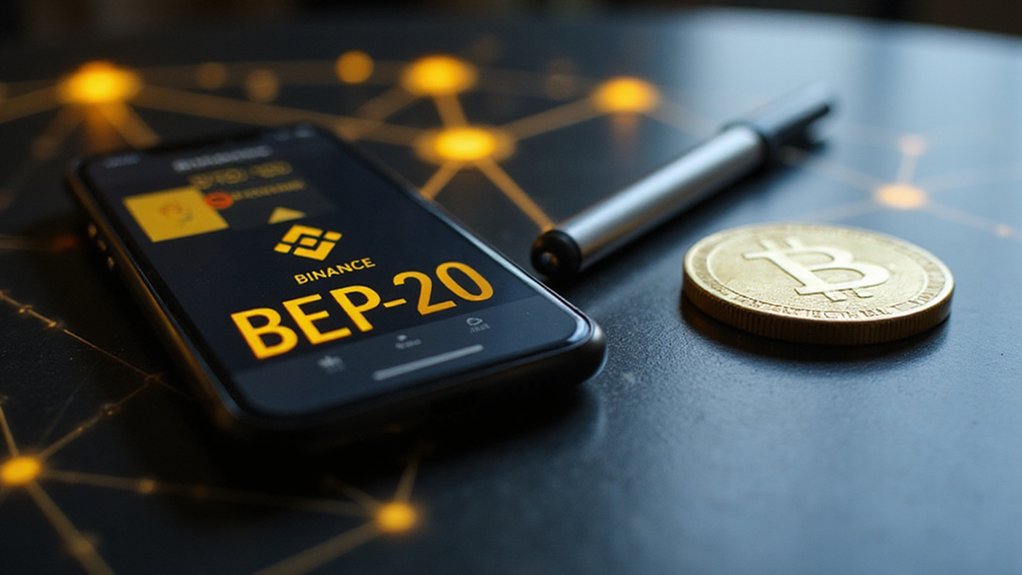BEP-20 is Binance Smart Chain’s token standard, basically Ethereum’s ERC-20 wearing BSC clothing. This framework enables developers to create transferable tokens without blockchain engineering degrees. It maintains critical functions like totalSupply and transfer while offering BSC’s trademark advantages: faster transactions and mercifully lower gas fees. DeFi enthusiasts appreciate its compatibility with Ethereum’s ecosystem and enhanced security features—blacklisting capabilities that can exile troublesome addresses. The standard’s efficiency makes it particularly compelling for those tired of Ethereum’s congestion taxes.

What exactly constitutes a token standard in the increasingly complex landscape of blockchain technology?
At its core, a token standard represents a set of rules and specifications that developers must follow when creating digital assets on a particular blockchain.
The BEP-20 standard—Binance’s answer to Ethereum’s ubiquitous ERC-20—serves as the fundamental framework for token creation on the Binance Smart Chain (BSC), offering developers a blueprint for launching tokens without the considerable effort of building an entire blockchain from scratch.
BEP-20 empowers developers to create Binance Smart Chain tokens using established protocols rather than reinventing blockchain architecture from the ground up.
BEP-20, which stands for “Binance Chain Evolution Proposal 20,” effectively extends and modifies Ethereum’s ERC-20 standard, preserving critical features such as transferability rules and supply definitions while adapting them to BSC’s unique architecture.
This deliberate compatibility (arguably one of crypto’s rare instances of sensible standardization) facilitates seamless migration between Ethereum and BSC ecosystems, a significant advantage in blockchain’s fractured landscape.
The standard defines essential functions—totalSupply, balanceOf, transfer, approve, and allowance—which establish the ground rules for token operations and transactions.
These specifications enable the creation of various crypto assets, from utility tokens to stablecoins, all operating within BSC’s ecosystem with remarkable efficiency.
Developers familiar with Ethereum’s programming paradigms will find themselves on familiar ground, though benefiting from BSC’s considerably lower transaction fees and faster confirmation times. BEP-20 provides faster transaction speeds compared to Ethereum, making it increasingly attractive for high-volume applications.
Unlike its sibling standard BEP-2 (which operates exclusively on Binance Chain), BEP-20 fully supports smart contracts and powers numerous decentralized finance applications across the Binance ecosystem.
This technical foundation has positioned BEP-20 as the backbone of BSC’s rapidly expanding DeFi landscape, facilitating everything from token swaps to yield farming with comparative ease.
The standard’s widespread adoption speaks to its practical utility: lower gas costs, faster transactions, and ERC-20 interoperability have made BEP-20 an attractive alternative for developers seeking the programmability of Ethereum without its prohibitive operational expenses—a balance of innovation and practicality increasingly rare in blockchain’s evolution.
Many traders prefer BEP-20 tokens because they can be traded with Binance’s native Binance Coin (BNB), which offers reduced trading fees across the platform.
BEP-20 also includes unique security parameters such as the ability to blacklist addresses, enabling developers to implement malicious account banning when necessary to protect their token ecosystems.
Frequently Asked Questions
How Do I Create My Own BEP-20 Token?
Creating a BEP-20 token involves several methodical steps: defining the token’s purpose and parameters, establishing a development environment with MetaMask configured to BSC, writing a smart contract that implements mandatory BEP-20 functions, and deploying it on the Binance Smart Chain.
Alternatively, one can utilize no-code platforms like Token Tool—simply connect a wallet, input token specifications, authorize the transaction (paying requisite BNB fees), and voilà—a freshly minted token with its own contract address.
What Are the Fees for BEP-20 Token Transfers?
BEP-20 token transfers command remarkably modest fees, averaging around $0.12 USD (paid in BNB), substantially undercutting their ERC-20 counterparts.
For USDT specifically, one might expect to part with merely $0.053 per transaction—a near-negligible sum that makes frequent transfers economically viable.
This fee efficiency stems from BSC’s design priorities: low congestion and high throughput.
Users must, however, maintain some BNB balance to facilitate these transfers, as the network’s validators don’t work pro bono.
Can BEP-20 Tokens Be Converted to Other Standards?
BEP-20 tokens can indeed be converted to other standards, primarily through cross-chain bridges or exchanges.
These mechanisms typically lock tokens on BSC while minting equivalent versions on destination networks (Ethereum’s ERC-20 being the most common conversion target).
Binance Bridge offers a straightforward path for such conversions, while certain centralized exchanges function as de facto conversion services.
The process involves varying gas fees and potential security considerations—a reality that underscores the blockchain ecosystem’s persistent fragmentation despite interoperability efforts.
Are BEP-20 Tokens Secure Against Common Vulnerabilities?
BEP-20 tokens, like all blockchain implementations, face significant security challenges.
While the standard itself is relatively robust, vulnerabilities often emerge from implementation errors—reentrancy attacks, integer overflows, and centralized control mechanisms remain persistent concerns.
Security-conscious developers mitigate these risks through rigorous auditing, open-source code practices, multi-signature governance, and timelocks.
Yet despite these precautions, no smart contract can claim absolute immunity from exploitation; the crypto ecosystem’s perpetual cat-and-mouse game between developers and attackers continues unabated.
Which Wallets Support BEP-20 Tokens?
BEP-20 tokens enjoy robust wallet support across multiple categories.
Popular options include Trust Wallet, MetaMask (when configured for BSC), and Binance Chain Wallet for software solutions.
Hardware security enthusiasts can utilize Ledger Nano devices, Trezor, or SafePal S1.
For multi-chain flexibility, Atomic Wallet, Coin98, and TokenPocket deliver seamless integration.
Web-based interactions are facilitated through various browser extensions—MetaMask again proving its versatility here, alongside dedicated options like the Binance Chain Wallet extension.









